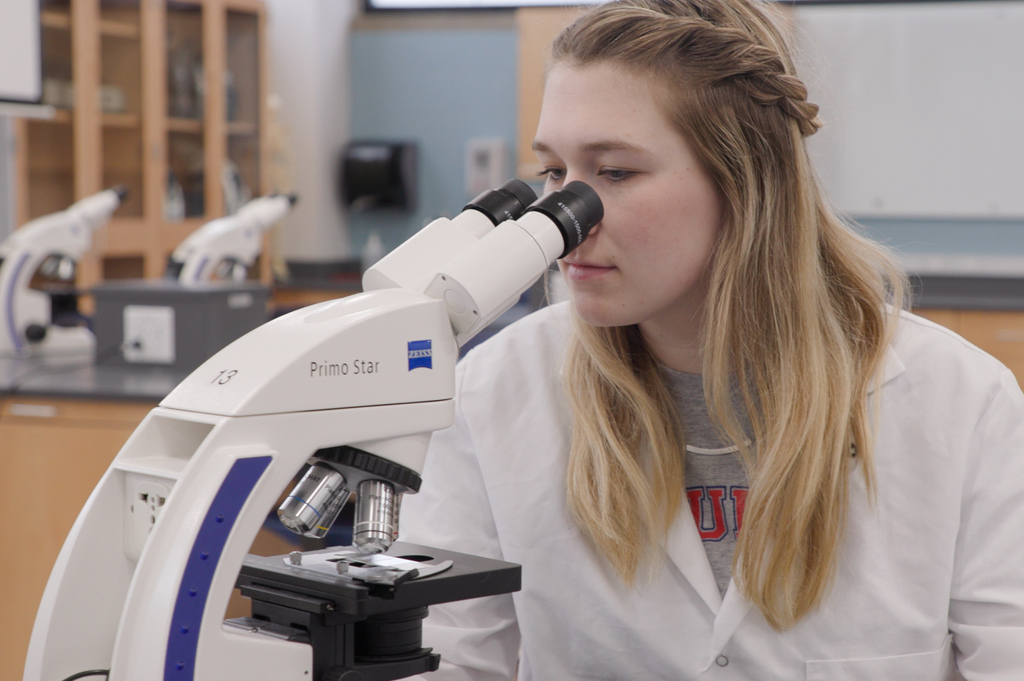Doctor of Osteopathic Medicine (DO)
You want to improve health equity and access to care for your community as a physician-leader. Duquesne’s Doctor of Osteopathic Medicine (DO) program focuses on a culture of wellness and preventative medicine for everyone.
It’s not just the methods; it’s a mindset.
Program Information
A DO degree from Duquesne University in Pittsburgh, PA will prepare you to be a physician-leader to champion health equity in medicine.
Join our students who have hearts for social justice, health equity and community
service to impact positive change in health care. And, doing it with a little fun!D.O. Admissions Requirements & Timeline
Built on our 145-year legacy of serving others, here you will:
Pathway Programs
Duquesne offers two pathway programs for students interested in advancing to medical school.

Master’s in Biomedical Sciences (MBS) – Graduate
You'll have a competitive edge and be prepared to demonstrate your ability to succeed in medical school or any health profession with an MBS degree. The 10-month, accelerated residential MBS program is for graduate students who have completed an undergraduate degree in the life sciences. The program covers the majority of the first semester of the medical school curriculum and features anatomy instruction with HoloAnatomy technology, physiology, pharmacology, pathology, microbiology, immunology, biochemistry and evidence-based medicine.

Early Assurance Program (EAP) – Undergraduate
The EAP is for Duquesne undergraduate first-year students interested in becoming physicians. Students must have high academic records of success and be admitted to a Duquesne academic major in Biological Sciences, Biochemistry, Pharmacy or Health Sciences, as well as our Pre-Medical and Health Professions Program (PMHPP). The program prepares students for the MCAT and medical school application process.
You have plans for medical school and we can help you get there. Contact us directly
with any questions about the program or admissions process.Contact Us
The D.O. Curriculum
You'll be prepared for anything because your curriculum will integrate scientific and clinical learning across all four years, beginning with foundational knowledge that progressively focuses as you identify and develop your professional goals.
During your first two years you will train in patient care, including family medicine, pediatrics, internal medicine and surgery, among others. Your training will include:
- Hands-on skills development in our state-of-the-art simulation hospital
- Clinically-oriented anatomy coursework using HoloAnatomy, as well as ultrasound and diagnostic radiography imaging
- Intensive cadaver-based dissection early in year 1
- Year 2 coursework with an intensive four-week board prep study program to prepare you for the COMLEX-USA Level 1 and USMLE Step 1 exams
- Independent learning, lectures, team-based and case-based group work
Your third and fourth years will focus on more intensive hands-on clinical training in the Medical School’s simulation hospital, as well as in our urban and rural clinical partner facilities across Pennsylvania, Ohio and West Virginia. To help you prepare for final examinations, assessments follow each rotation.
Duquesne's medical school curriculum meets all Commission on Osteopathic College Accreditation
(COCA) guidelines. * Denotes Core Rotation * Denotes Core Rotation **One elective should be a sub-internship in the specialty the student plans to go
into You understand the importance of research and how it contributes to the greater good.
We do, too, and our faculty will encourage you to join them in conducting and participating
in research and other scholarly activities in biomedical, clinical and translational
research. By doing so, you not only contribute to the larger body of scientific and
medical knowledge of our community, but you improve your application for residency
positions. Here are the answers to some frequently asked questions that you may find helpful.
Please let us know if you have any others. Yes, we will offer an Early Decision Admissions Track (EDT), and an applicant’s preference for being considered for early admissions can
be designated on the secondary application. Interviews for early admissions begin
in July of the year prior to matriculation. Dependent on class availability and in limited cases, students who would like to transfer
to DUQCOM may be accepted if they have: Yes, DUQCOM is a professional school and members of our community represent the Medical
School, the University and the profession. It is the expectation that all students,
faculty and staff maintain professionalism in their appearance, hygiene and behavior. Your medical school classes start every July. The incoming cohort will start with
a two-day orientation program prior to classes beginning. We are here to help! The DUQCOM has a multi-layered plan for supporting students both
academically and emotionally, consisting of a peer tutoring program, faculty and course
directors, assigned biomedical and clinical faculty advisors, a Department of Academic
Excellence, and resources on campus for support of physical and emotional wellness. DUQCOM will follow an open-door policy so that students will have easy access to the
support and guidance they need to feel successful in the program. Additional physical
and emotional health services are available both on- and off-campus, on a 24/7 basis,
to best meet the needs of our students. In addition, each class is divided into learning communities that are meant to provide
a more individualized experience and supportive environment for our students to engage
with the material and one another. These communities provide long-term mentoring relationships
with faculty members–including not only physicians, but also basic science and librarian
mentors–to assist students in their growth. This Handbook is your guide to the Duquesne University College of Osteopathic Medicine
(DUQCOM or the COM). It contains program-related information as well as information
related to the policies, procedures, and resources applicable to DUQCOM applicants
and students. This Handbook works in conjunction with other Duquesne University policies,
regulations, agreements, and guidelines, and is not a contract. It is not all-inclusive
of the policies and procedures of DUQCOM. DUQCOM reserves the right to amend and update
this document as needed without notice, as circumstances dictate. Applicants and students
are required to follow all policies and procedures that are outlined in this Handbook.
Violations of any of the aforementioned regulations are subject to disciplinary action
up to and including dismissal.Curriculum
DO Program FAQs
See COM Student Handbook



